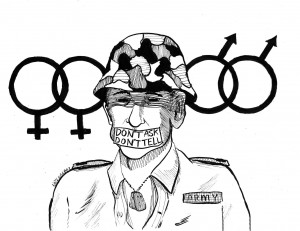
The Obama administration’s attempt to repeal former President Clinton’s “Don’t Ask, Don’t Tell” policy within a defense spending bill failed on the Senate floor Sept. 21.
Had the proposal gone through, the United States could have proved to the world and to itself that it appreciates all its citizens and their ways of life. But right now, we are still embarrassingly behind with this dated policy. We should instead be at the forefront if we still want the title “land of the free.”
The current policy bans the military from finding out a person’s sexual identity — while still not allowing anyone in the armed forces who claims to be a homosexual.
Senate Democrats fell short of the 60 votes needed to repeal the act. Three Democrats joined all but one Republican (who didn’t vote) in opposing the bill, causing it to fail, 56-43.
In speaking against the measure, Republican John McCain pointed out how the Obama administration called for a report on the effects of repealing DADT on military readiness.
McCain wants to wait until the survey is concluded a couple of months from now before repealing DADT. But the lesbian and gay community who have dealt with the issue for 17 years now say it’s time.
Not only has federal Judge Virginia Phillips said DADT violates the lesbian and gay community’s First and Fifth Amendment rights, Chairman of the Joint Chiefs of Staff Mike Mullen has stated his opposition to DADT.
“The law needs to change,” Mullen said in a town hall meeting with the 18th Airborne Corps. “Fundamentally, it’s an issue of our values. It’s very critical for us as an institution, and I’m hard-pressed not to support policy and a law that forces individuals to come in and lie everyday.”
It seems to be high time for a change to be made if the Joint Chiefs of Staff Chairman is saying so.
According to the Service Members Legal Defense Network website, 75 percent of America’s youth are “ineligible to serve in our military because of inadequate education, criminal records or weight problems.” Since we have such a small pool of eligible soldiers to begin with, why should we make it any smaller?
Those who want to serve and make their country proud should be able to do so.
Thirty other countries in the world encourage all their citizens to serve in their armies. Countries like South Africa, Italy, England, Canada and Israel all allow gay servicemen and women to join the military.
As for now, Reid says DADT will be done away with in a lame-duck session after the November election. So what we need is to let our voices be heard, saying collectively and with no prejudice that we are against any restriction on entering the military based on sexual orientation.






















